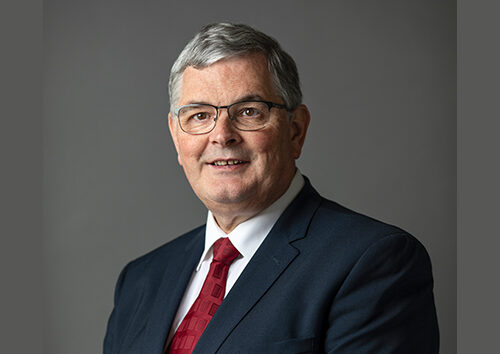13 February 2019 | Helskinki, Finland [Pekka Kärkkäinen]
Dr Ganoune Diop, Director of Public Affairs and Religious Liberty for the worldwide Seventh-day Adventist Church, made the opening presentation at a Seminar on religious freedom held in the Finnish Parliament library on Wednesday, 6 February.
 The seminar was organized by SVKN (the Council of Free Churches in Finland), together with most of the established religious bodies, and even included an interview from free-thinkers. No religious or non-religious bodies were excluded.
The seminar was organized by SVKN (the Council of Free Churches in Finland), together with most of the established religious bodies, and even included an interview from free-thinkers. No religious or non-religious bodies were excluded.
About 80 interested people listened as Diop dealt with the issue of freedom of religion as an inalienable human right. He emphasised that freedom of religion is not only a legal right but is fundamentally connected with the idea of humanity. “It is a global principle that defines what it means to be human,” he said. According to Diop, freedom of religion is about freedom of conscience, freedom of speech, the right to gather together, and the freedom to make decisions. It is equally an antidote to human exploitation.
Diop was one of three speakers and eight Members of Parliament who were invited. Former President of Finland Tarja Halonen also participated in the event, which was part of the United Nation’s Week of Mutual Understanding. The event was opened and concluded by the President of the Seventh-day Adventist Church in Finland, pastor Kalervo Aromäki.
Professor Elina Vuola from the University of Helsinki then dealt with the issue of the importance of understanding religions. She noted how important religious values are outside of Western Europe. More attention is now paid to religions and their values in international relations, she stated. She also warned against the danger of generalizing a religion and its practitioners based on a single crime committed by a member of that religion. She noted some newspapers that like to sensationalise in this way.
 In the final speech, Professor Tuula Sakaranaho, also from the University of Helsinki, spoke about the principles of freedom of religion or belief, not just as individual freedom, but also within the whole context of society. Sakaranaho pointed out that often freedom of religion, the right to exercise faith, may be perceived by someone else as negative freedom of religion, a restriction of rights. She also reminded the audience that society cannot legislate to control thinking, nor can religions be discriminated against. However, she recognised that this is a delicate topic internationally, because roughly three out of four people in today’s world do not enjoy freedom of religion.
In the final speech, Professor Tuula Sakaranaho, also from the University of Helsinki, spoke about the principles of freedom of religion or belief, not just as individual freedom, but also within the whole context of society. Sakaranaho pointed out that often freedom of religion, the right to exercise faith, may be perceived by someone else as negative freedom of religion, a restriction of rights. She also reminded the audience that society cannot legislate to control thinking, nor can religions be discriminated against. However, she recognised that this is a delicate topic internationally, because roughly three out of four people in today’s world do not enjoy freedom of religion.
The seminar concluded with a panel of seven Members of Parliament answering questions about the topic. Their views varied considerably in an effort to balance rights between the individual and society, although everyone was ready to support the principle of freedom of religion as a human right.
In addition to the actual seminar, Dr Diop and Pastor Aromäki visited the Council of the Lutheran church. They met representatives and shared their thought that Adventists and Lutherans must continue to dialogue on this important topic now that the door has been opened for it.
Aromäki was the one who first introduced the idea for the symposium at one of the SVKN meetings. He noted that one of the benefits for the smaller denominations in Finland could be that they will be recognized as a viable voice on important human matters. For him, this very seminar is positive proof that this can happen.
tedNEWS Staff: Victor Hulbert, editor; Sajitha Forde-Ralph, associate editor
119 St Peter’s Street, St Albans, Herts, AL1 3EY, England
E-mail: [email protected]
Website: www.ted.adventist.org
tedNEWS is an information bulletin issued by the communication department of the Seventh-day Adventist Church in the Trans-European Division. Readers are free to republish or share this article with appropriate credit including an active hyperlink to the original article.



